In episodic television a director was not submitted a script for an assignment, which he could either turn down or accept. Once a director was established, the usual procedure was the production office for a show would call his agent and book him for a specific date for a script to be determined in the future. That script, according to DGA rulings, was to be sent to him 4 days before he was scheduled to report. Many times he was lucky if there was a final script awaiting him when he reported to the studio. I had some unlucky late arrivals, some of which I’ve described on my website, but that was not the situation at STAR TREK. Other problems reared up there.
THE COMPANION
As the Enterprise traveled from planet to planet, many unusual, unhuman adversaries were encountered. I was lucky that never did I have to contend with an adversary whose torso had two legs, two arms and a head, all made up and costumed in a manner just as appropriate to go trick or treating on Halloween. I had 4 unhuman ‘guest stars’ like that on my treks. Let me introduce you to 2 of them. There is no question that the most effective of those adversaries was the incomparable Gene Coon’s Companion in METAMORPHOSIS (https://senensky.com/metamorphosis/). I’ve already done 3 posts on METAMORPOHOSIS covering the activities in this story of Kirk, Spock, Doc, the castaway, Zefram Cochrane, and the seriously ill Federation Ambassador Nancy Hedford. So the first half of this post is going to concentrate on the Companion’s involvement in the story. Since the Companion is just a collection of amorphous gases, I thought of it as a cloud, it’s quite a story. We first meet this character at a distance from the shuttlecraft as it travels through space on its way back to the Enterprise.
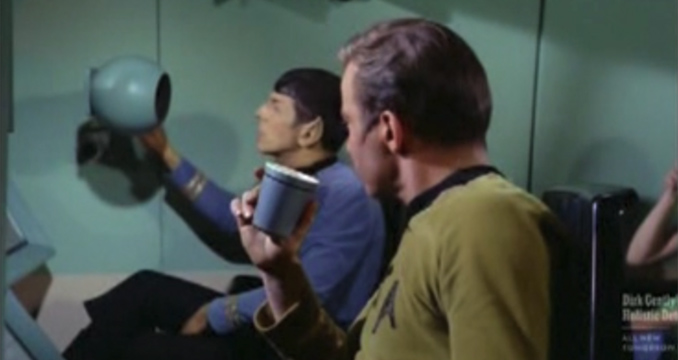
That unknown force (Kirk referred to it as ‘that thing out there’) deposits the shuttlecraft on deserted planet Gamma Canaris N, where they meet Zefram Cochrane, a castaway who is evasive in providing information about himself. He takes them to the home he has built and while he is in another room, Spock makes a discovery.
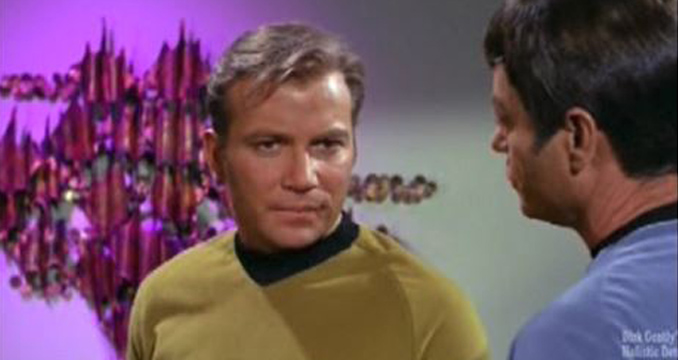
It is the force that has taken them off their course to the Enterprise, now checking on the group. It disappears immediately when the three appear in the doorway. Cochrane reveals that it was the creature they’ve just seen that has brought them to this place. He calls it the Companion. It is further revealed that Cochrane is a famous spaceman, who is thought to have died 150 years ago. He was an old man who had gone into space to die. The Companion had rescued him, brought him to this planet and rejuvenated him, made him young again. It had brought these people to this planet to keep him company.
Spock returns to the shuttlecraft to check out what needs repair so they can leave..

The Companion has made another appearance. It is not going to let this group leave and it gives Spock a warning of its power. Meanwhile Kirk and Doc get Cochrane to contact the Companion,

Spock, realizing an ingredient in the Companion is electricity, devises an instrument to combat the Companion.
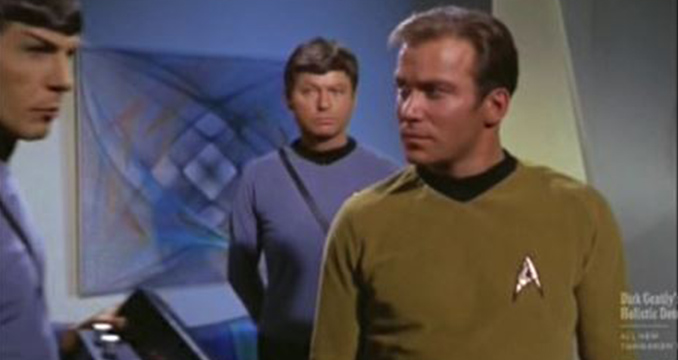
Kirk orders Spock to adapt the translator so it can be used to communicate with the Companion.

A few moments later Ambassador Hedford comes from Cochrane’s home. She is no longer ill. Cochrane immediately recognizes that she is the Companion, that it has inhabited Hedford’s body. Cochrane and the Companion go off together.
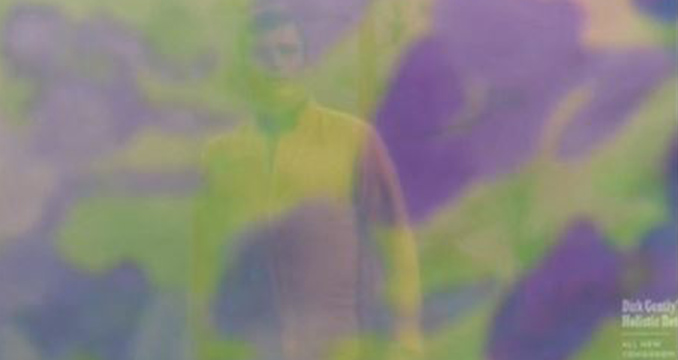
I am still in awe of the imaginative creativity, the sensitivity that Gene Coon produced in his creation of the Companion, in his entire script. I’ve said it before and I say it again in the loudest voice possible:
Gene Coon is an unsung hero of STAR TREK.
THE AMBASSADOR
IS THERE IN TRUTH NO BEAUTY? (https://senensky.com/is-there-in-truth-no-beauty/) was written by Jean Lisette Aroeste, a UCLA librarian with no prior television writing credits. Her unsolicited script was read by STAR TREK co-producer Robert Justman, who recommended it to Gene Roddenberry. In her script Ms. Lisette created another unusual persona for an appearance on STAR TREK — the Medusan Ambassador. She also provided an intriguing, anticipatory prelude to prepare for his entrance.

WOW! What a job for casting — a character with a formless physical appearance, so utterly hideous that the sight of a Medusan brings total madness to anyone who views him.
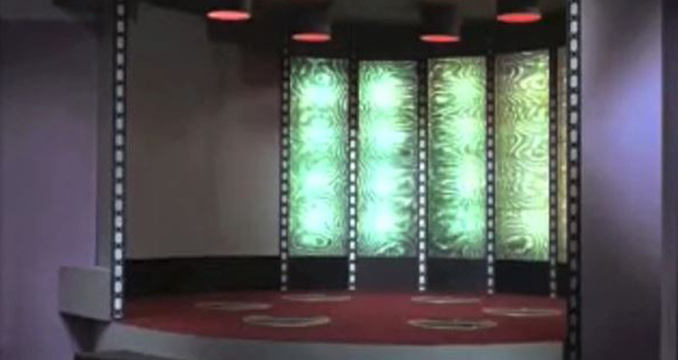
Since only Vulcans can handle the sight of a Medusan, Mr. Spock was assigned to oversee Ambassador Kollos’ stay on the Enterprise as he was being conveyed from the Federation back to his home planet.
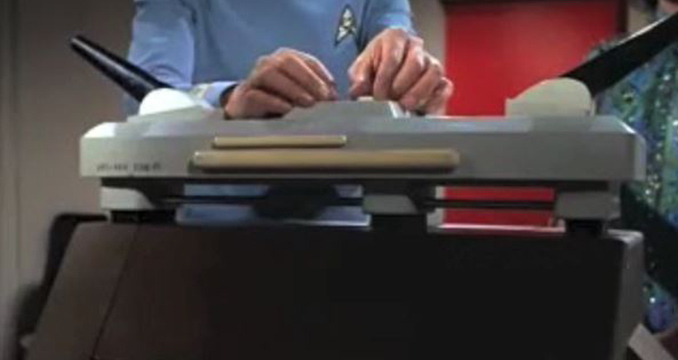
Here was where this amazing script in postproduction began its derailment. As Spock asked to meet the Ambassador, there was a feeling of reverential respect mixed with wonder. Spock was in awe. His reaction was evident when he said to Dr. Jones, “I almost envy you your assignment.” The addition of the flickering green light and the animation imposed a cartoonish unreality on the true reality that was occurring. It obscured the true drama of the scene — Dr. Jones’ intuitive antipathy to Spock. She is sensing in him a challenger for the position she holds with the Ambassador. Without that added effect the background music would have been different. It would have been inspiring, passionate.
I will not go into the many objections I voiced in my post on this production, instances where the image of the Ambassador’s box were falsely inserted into scenes.
Larry Marvick, who had beamed onto the Enterprise prior to the Ambassador’s entrance, was madly in love with Dr. Jones. His plea for her to leave her position with the Ambassador and stay with him was rejected. As he exited her chamber…
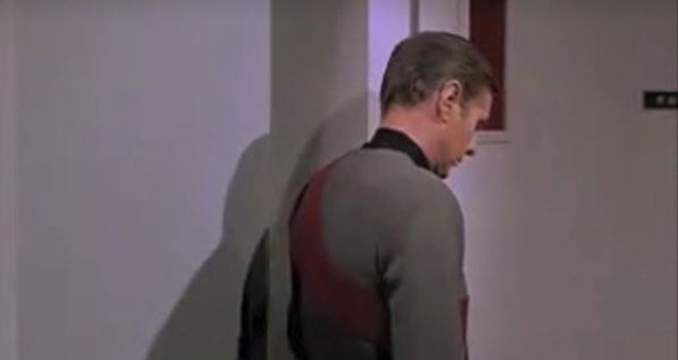
Again, all of my previous objections to the green light and animation, plus more! The madness begins when Marvick gets his first look at the Ambassador. The green light and animation began before. The effect is not that Marvick is going mad by witnessing a Medusan. The effect is that the Ambassador, a serene, peaceful man, is attacking him. David Frankham’s performing of the madness was very effective without any assistance when he left the stateroom, down the corridors, in the elevator and especially when he reached Scotty’s operational area. It didn’t need any visual additions. And dramatically Marvick’s madness was the Hitchcockian macguffin to reach the real drama of the sequence — because of it, the USS Enterprise was endangered. It ended up at a place in space foreign even to chief engineer Lieutenant Commander Montgomery Scott.
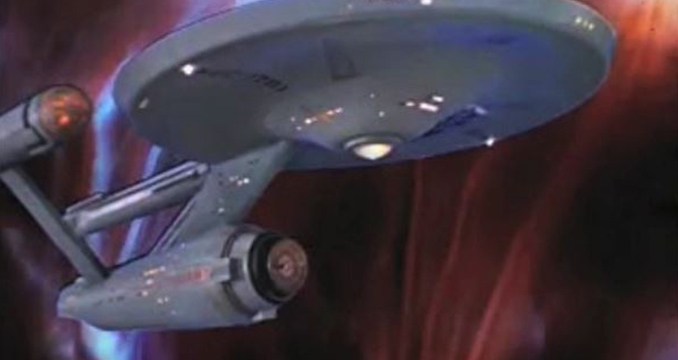
Only the Vulcan half of Spock could face a Medusan. His human half was vulnerable.
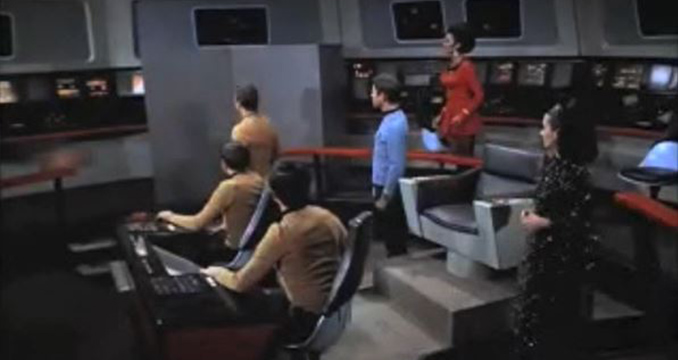
Just as the first half of this post was concerned with the Companion’s involvement, this second half has been the Ambassador’s involvement. And just as THE FUGITIVE’s Dr. Richard Kimble had to escape each week so he could appear the following week, Spock could not remain a madman as this episode ended. You’ll have to visit my website to see how he recovers.
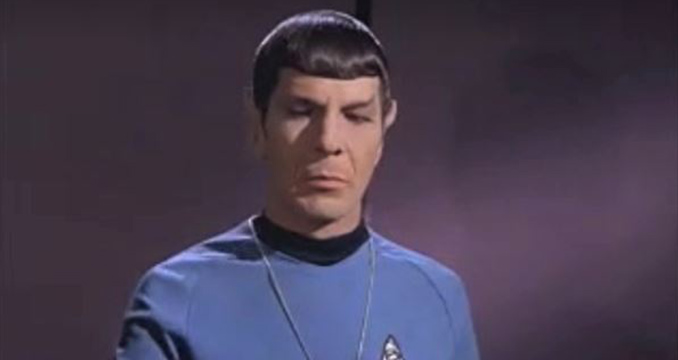
Jean Lisette Aroeste wrote one more script for STAR TREK. She never wrote again for film or television.


